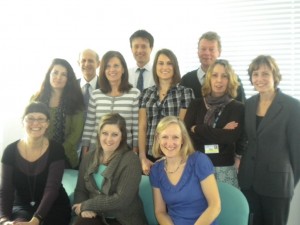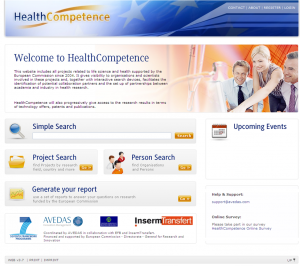BUCRU incorporates the Dorset Office of the National Institute for Health Research (NIHR) Research Design Service – South West (RDS-SW). This means that in addition to the support outlined in previous blogs, we can also provide access to the following:
RDS Grant application workshop.
This workshop is going to be held at Bournemouth University on the 29th February 2012 (http://www.rds-sw.nihr.ac.uk/grant_workshop.htm). Although the official deadline for applying has recently passed, it is worth contacting us to see if there are any remaining places. The workshop will also be held in other locations in the South-West region in the near future.
This is a one-day workshop for researchers who are developing proposals with the intention of applying for a grant. The workshop does not provide detailed training in research methodology; rather it more generally covers the full range of issues inherent in developing a successful grant application. It will be of relevance to researchers applying to any of the major health research funders, but particularly the NIHR funding schemes.
Researchers will need to send in advance the latest draft of their research proposal. As a minimum they should have a plan for a project but, ideally, a worked up proposal, perhaps even one that has been previously rejected. All proposals will receive detailed written feedback from the RDS team.
Topics include
- The application as a marketing document, selling the topic, selling the method, and selling the team;
- The balanced team;
- Clarity of description and explanation;
- Feasibility issues;
- Identifying and avoiding potential pitfalls
RDS Residential Research Retreat
The Residential Research Retreat (http://www.rds-sw.nihr.ac.uk/rrr_home.htm) provides an opportunity for research teams to develop high quality health related research proposals suitable for submission to national peer-reviewed funding schemes. The aim of the Retreat is to provide the environment and support to promote rapid progress in developing proposals over a relatively short time period.
This Research Retreat is open to health professionals and academics working within the South West. Applications to attend the Retreat should be submitted by a team of three people with varied skills. Applications are reviewed competitively and places awarded to the most promising team proposals. The deadline for the next Research Retreat has passed, but it is anticipated that applications will be invited again later in the year.
At the retreat participants are supported by a range of experts while developing their research proposal. They work intensively on their proposal, while learning how to maximise its chances for successfully securing a grant.
In addition, the Residential Research Retreat helps participants develop the key skills needed to conduct research in a clinical setting as well as nurturing presentation skills and giving them the confidence to tackle research problems.
RDS Scientific Committee
The RDS Scientific Committee (http://www.rds-sw.nihr.ac.uk/scientific_committee.htm) provides an excellent opportunity for researchers in the south-west to obtain a critical review of a proposed grant application before it is sent to a funding body. The Committee brings the benefit of seeing the proposal with “fresh eyes”, replicating as far as possible the way the real funding committee will consider the application. Committee members include senior research consultants who have considerable experience of obtaining research funding, resulting in comprehensive comments and advice fed back.
Committee meetings take place approximately 9 times per year. To submit a study for review at the meeting, study paperwork must be provided to the Committee via BUCRU two weeks prior to the meeting date, and preferably a couple of months before the intended funding deadline.
Centre of Postgraduate Medical Research and Education (CoPMRE) Annual Symposium
In addition to events aimed at supporting the development of grant applications we also host an event geared towards dissemination. The CoPMRE Annual Symposium will be held on the 11th September 2012 at the Bournemouth University Talbot Campus. These successful annual conferences have been running for the past nine years and have featured themes such as ‘Professionalism and Collaboration’, ’Research Innovation’ and ‘Interprofessional Learning’. This year’s theme will be on using ‘Social media techniques in healthcare research and education’. The conference is open to all healthcare professionals and academics. More information will be posted on our website in due course and you will be able to register online nearer the time. For further information on the symposium please contact Audrey Dixon, Conference Manager (adixon@bournemouth.ac.uk ).
Contact us: For further information about, and access to, the Grant applications workshop, the Residential Research Retreat and the Scientific Committee please contact:
Louise Ward (administrator):
Bournemouth University Clinical Research Unit
R505 Royal London House
Christchurch Road
Bournemouth BH1 3LT
Tel: 01202 961939


























 Expand Your Impact: Collaboration and Networking Workshops for Researchers
Expand Your Impact: Collaboration and Networking Workshops for Researchers Visiting Prof. Sujan Marahatta presenting at BU
Visiting Prof. Sujan Marahatta presenting at BU 3C Event: Research Culture, Community & Can you Guess Who? Thursday 26 March 1-2pm
3C Event: Research Culture, Community & Can you Guess Who? Thursday 26 March 1-2pm UKCGE Recognised Research Supervision Programme: Deadline Approaching
UKCGE Recognised Research Supervision Programme: Deadline Approaching ECR Funding Open Call: Research Culture & Community Grant – Apply now
ECR Funding Open Call: Research Culture & Community Grant – Apply now ECR Funding Open Call: Research Culture & Community Grant – Application Deadline Friday 12 December
ECR Funding Open Call: Research Culture & Community Grant – Application Deadline Friday 12 December MSCA Postdoctoral Fellowships 2025 Call
MSCA Postdoctoral Fellowships 2025 Call ERC Advanced Grant 2025 Webinar
ERC Advanced Grant 2025 Webinar Update on UKRO services
Update on UKRO services European research project exploring use of ‘virtual twins’ to better manage metabolic associated fatty liver disease
European research project exploring use of ‘virtual twins’ to better manage metabolic associated fatty liver disease